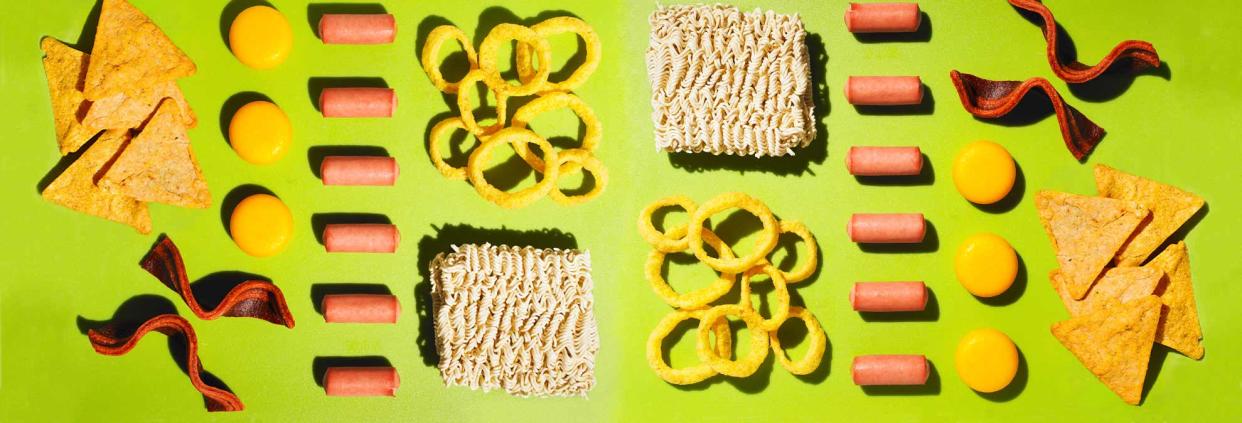Ultra-Processed Foods Linked to Increased Cancer Risk, New Study Shows

Consumer Reports has no financial relationship with advertisers on this site.
There's a strong link between consuming "ultra-processed" foods such as soft drinks and packaged snacks and the risk of developing cancer, a new study of more than 100,000 people reveals.
While much of what we consume is processed to some degree, these so-called ultra-processed foods also include sweets; mass-produced, pre-packaged bread; processed meat products (such as hot dogs and chicken nuggets); instant soups; and pre-prepared packaged meals.
They don't include foods such as pasta or rice, which are labeled “minimally processed,” or fruits packed in syrup, vegetables with added salt, or salted meats, which are considered “processed.”
What The New Research Shows
In the new study published Wednesday in the medical journal The BMJ, participants were followed for eight years. They kept 24-hour food diaries, indicating which types of food they ate. Researchers then measured what proportion of each individual’s diet was ultra-processed.
The researchers’ analysis showed that for every 10 percent of a respondent’s diet that was made up of ultra-processed foods, there was a 12 percent increase in overall cancer risk (and an 11 percent increase in breast cancer risk).
Although consuming ultra-processed foods has previously been connected to obesity, high blood pressure, and high cholesterol, the researchers believe this is the first study that connects a diet high in these types of foods to cancer.
“I believe our findings will prompt much new research on the connections between processed foods and disease,” says Mathilde Touvier, Ph.D., nutritional epidemiologist with the Sorbonne Paris Cité Epidemiology and Statistics Research Center.
What Experts Still Don't Know
Some experts, however, caution that further research is needed.
Martin Lajous, M.D., an epidemiologist with the Harvard T.H. Chan School of Public Health who wrote an editorial accompanying the study, says it's important for researchers to determine which additives or food categories specifically could be increasing cancer risk.
Lajous says the “ultra-processed” designation covers a broad range of foods, all with their own additives, nutritional makeups, and methods of processing.
“It’s a fair first step to link all of these foods to cancer,” says Lajous, “but we need research that narrows down which specific foods were consumed” to see what they share in common.
Still, there are no nutritional drawbacks to eating a diet that contains fewer ultra-processed foods, he notes. In fact, there can be marked health gains.
Processed foods often come with downsides such as high levels of added sugars and sodium, says Amy Keating R.D., a Consumer Reports’ nutritionist.
“As a general rule, the healthiest diets are made up of whole foods—those that have been minimally processed,” Keating says. “For your heart, for your weight, and for your overall health, try to center the majority of your meals on whole grains, vegetables, plant proteins (such as tofu or legumes), fruit, fish, and lean meats whenever possible.”
Cutting Back on Ultra-Processed Foods
To begin with, start slow. Don’t try to transform your diet all at once, says Keating. Set manageable goals to eat two or three fewer ultra-processed foods per week, so it doesn’t seem overwhelming. You can also add whole foods, such as fresh vegetables or a piece of fruit, to a meal that’s mostly processed—for example, have a salad with that hot dog.
Make it yourself. Many pre-packaged foods like salad dressing, granola, or soup can all be made at home, giving you total control of the ingredients, says Keating. (Try these 9 easy healthy recipes from CR’s test kitchen).
Plan ahead with snacks. Don’t get stuck in a situation where processed snack foods are your only option. Keep items like trail mix, nuts, fruit, and carrot sticks on hand.
Make healthy swaps. There are all sorts of nutritious foods that you can sub in for processed ones. Try air-popped popcorn instead of potato chips, oatmeal with fruit instead of sweetened cereals, or swap in plain yogurt with fruit instead of the sweetened stuff.
More from Consumer Reports:
Top pick tires for 2016
Best used cars for $25,000 and less
7 best mattresses for couples
Consumer Reports is an independent, nonprofit organization that works side by side with consumers to create a fairer, safer, and healthier world. CR does not endorse products or services, and does not accept advertising. Copyright © 2018, Consumer Reports, Inc.

